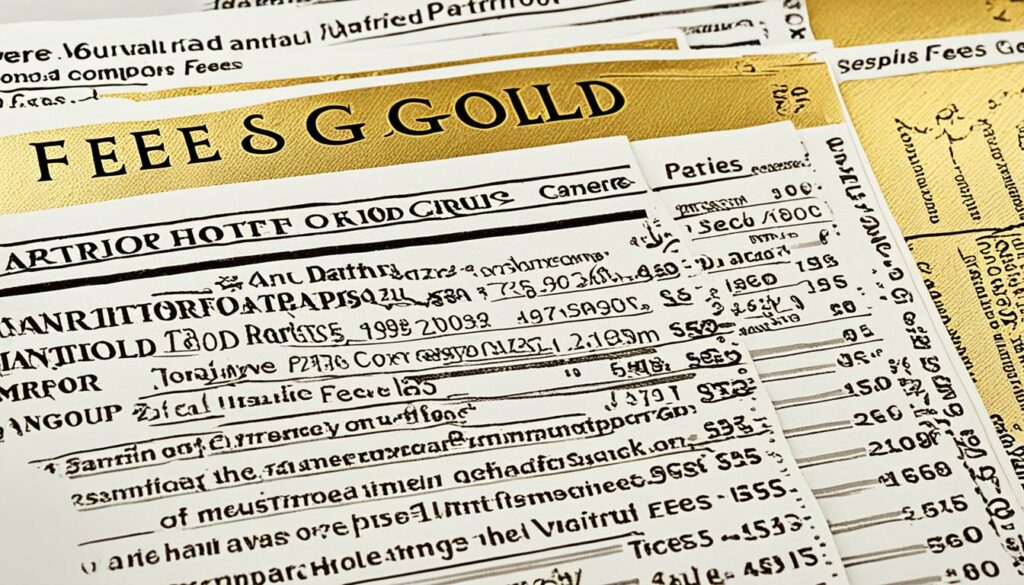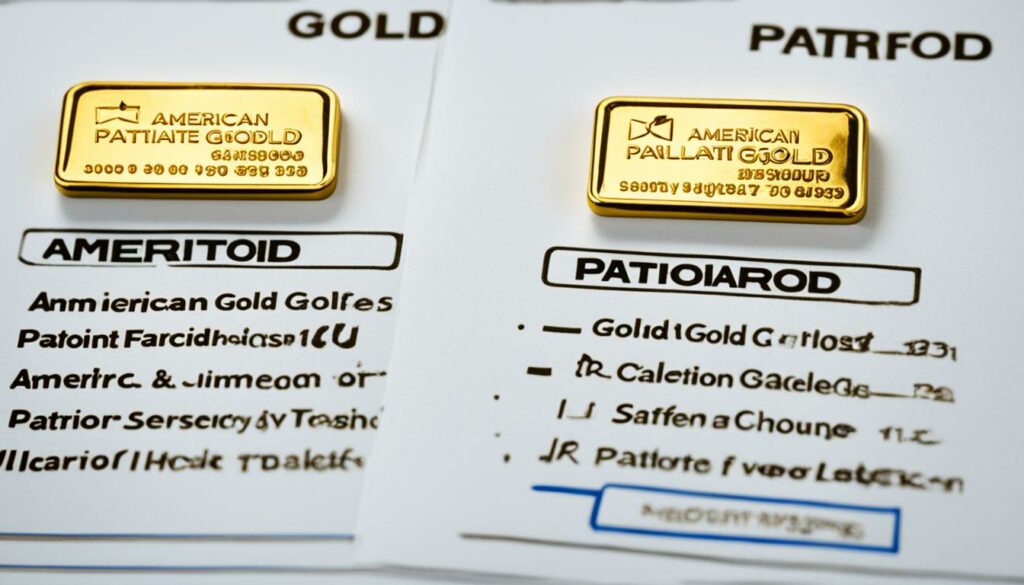Are you aware that investing in gold could safeguard your wealth and expand your portfolio? With financial markets being unpredictable, many people are choosing precious metals as a secure and dependable investment choice. If you’re thinking about a gold IRA, it’s worth looking into Patriot Gold Group and American Hartford Gold Group. Let’s analyze the main variations between these two well-respected companies to assist you in making an informed investment decision.
Key Takeaways:
- Investing in gold can help protect your wealth and diversify your portfolio
- Patriot Gold Group and American Hartford Gold Group offer valuable gold IRA options
- Comparing factors like annual fees, minimum deposit requirements, available metals, buyback options, and customer service is crucial
- Consider your individual investment goals and preferences before making a decision
- Seek advice from financial professionals and conduct further research to ensure informed decision-making
Benefits and Features of Patriot Gold Group and American Hartford Gold Group
Both Patriot Gold Group and American Hartford Gold Group offer a range of benefits and features that make them attractive options for investors. Understanding the unique advantages each company brings to the table is essential in making an informed decision about your investment strategy.
Patriot Gold Group
Patriot Gold Group provides a gold Individual Retirement Account (IRA) with several notable benefits. One of the key advantages of choosing Patriot Gold Group is the absence of account fees for large investors. This can significantly reduce the costs associated with managing your investment. Additionally, Patriot Gold Group offers the flexibility to choose your own custodian for your gold IRA, allowing you greater control over your investment decisions.

American Hartford Gold Group
American Hartford Gold Group is another reputable company with its own set of benefits and features. One of the standout features of American Hartford Gold Group is its lower minimum deposit requirement, making it more accessible to a wider range of investors. Furthermore, American Hartford Gold Group offers a unique incentive to new customers by waiving fees for the first year of account ownership, which can provide substantial savings. The company has also received an A+ rating from the Better Business Bureau, a testament to its commitment to customer satisfaction and reliability.
| Company | Benefits | Features |
|---|---|---|
| Patriot Gold Group | No account fees for large investors | Option to choose your own custodian |
| American Hartford Gold Group | Lower minimum deposit requirement | Fees waived for the first year |
When considering which company to choose for your gold IRA, it is crucial to weigh these benefits and features against your individual investment goals and requirements. Take into account factors such as account fees, custodian options, minimum deposit requirements, and fee waivers to find the company that aligns best with your financial needs.
Annual Fees Comparison
In evaluating the long-term costs of investing with either company, it’s essential to consider the annual fees charged by Patriot Gold Group and American Hartford Gold Group.
Patriot Gold Group imposes an annual fee of $200. On the other hand, American Hartford Gold Group’s annual fees vary between $175 and $225, with the first year waived for qualified investors.
These fees play a crucial role in the overall expenses associated with maintaining a gold IRA. It’s important to factor in this cost when making a well-informed decision about which company aligns best with your investment goals.
| Patriot Gold Group | American Hartford Gold Group |
|---|---|
| $200 | Pricing Range: $175 – $225 (First year waived for qualified investors) |

Analyzing the Annual Fees
Comparing the annual fees of Patriot Gold Group and American Hartford Gold Group reveals some distinct differences in cost. While Patriot Gold Group has a fixed fee of $200, American Hartford Gold Group offers a slight price range.
Investors who choose American Hartford Gold Group may benefit from the potential savings during the first year, given the waived fees for eligible clients. However, it’s important to consider the long-term costs beyond the initial year.
By understanding the annual fees associated with each company, investors can make informed decisions regarding their gold IRA investments.
Minimum Deposit Requirements
When considering a gold IRA, one of the crucial factors to take into account is the minimum deposit requirement. In this section, we will compare the minimum deposit requirements for both Patriot Gold Group and American Hartford Gold Group, providing you with the necessary information to make an informed decision.
Patriot Gold Group
Patriot Gold Group requires a minimum deposit of $25,000 to open a gold IRA. This minimum deposit allows investors to have access to a range of investment options and benefits offered by the company. Additionally, Patriot Gold Group provides a fee-free IRA option for individuals with a minimum deposit of $100,000, making it an attractive choice for high net-worth investors.
American Hartford Gold Group
American Hartford Gold Group has a lower minimum deposit requirement of $10,000 to open a gold IRA. This lower threshold offers investors with a more accessible entry point to begin their gold IRA journey. It caters to individuals with varying investment budgets, making it a viable option for a wider range of investors.
Consider your investment budget and long-term goals when deciding which minimum deposit requirement aligns with your needs. It’s essential to choose a minimum deposit that allows you to comfortably invest and take advantage of the benefits and services provided by the respective company.

| Company | Minimum Deposit Requirement | Special Offer |
|---|---|---|
| Patriot Gold Group | $25,000 | $100,000 minimum deposit for fee-free IRA option |
| American Hartford Gold Group | $10,000 | No special offer |
Available Metals
When considering a gold IRA, it’s important to explore the options for available metals. Both Patriot Gold Group and American Hartford Gold Group offer gold IRAs, providing investors with the opportunity to diversify their portfolios and protect their wealth. However, it’s worth noting that these companies may also offer investment options in other precious metals.
Investors who are interested in diversifying beyond gold may find that both Patriot Gold Group and American Hartford Gold Group offer options for silver, platinum, and palladium IRAs as well. These additional metals can provide further protection against market volatility and inflation.
To determine which metals are offered by both companies, it’s essential to review the investment options and consult with the respective firms. Understanding the range of metals available will help investors make informed decisions based on their individual investment goals and risk tolerance.
Integration of precious metals into an IRA can provide a hedge against economic uncertainty, inflation, and geopolitical events. It’s crucial to carefully consider the available metals and their potential for growth and stability when evaluating the offerings of both Patriot Gold Group and American Hartford Gold Group.

Gold IRA vs. Other Metals IRAs
“Investing in a gold IRA offers a time-tested strategy for asset preservation, but it’s important not to overlook the potential benefits of other precious metals. Silver, platinum, and palladium have their own unique properties and investment potential, and including them in an IRA can provide a well-rounded and diversified portfolio.”
Buyback Options
One important aspect to consider when selecting a gold IRA company is the buyback options they offer to their customers. In this section, we will explore the buyback programs provided by both Patriot Gold Group and American Hartford Gold Group.
Both Patriot Gold Group and American Hartford Gold Group are committed to ensuring the satisfaction of their customers by offering buyback options for precious metals. This means that if you decide to sell your investments in the future, both companies are willing to repurchase them.
When considering the buyback options, it is crucial to assess the specific terms and conditions set forth by each company. Evaluating these details can help you make an informed decision and choose the company that aligns best with your investment goals.
Now, let’s take a closer look at the buyback options provided by Patriot Gold Group:
Patriot Gold Group offers a comprehensive buyback program that allows investors to sell their precious metals back to the company at competitive prices. They guarantee a fair market value for your investments, ensuring an upfront and transparent process.
And here are the buyback options offered by American Hartford Gold Group:
American Hartford Gold Group has a well-established buyback program that enables customers to sell their precious metals back to the company. They prioritize fair pricing and a straightforward process, ensuring that investors can liquidate their investments with ease when needed.
Remember, having reliable buyback options is crucial for maintaining liquidity and flexibility in your investment portfolio. By carefully reviewing the details of the buyback programs offered by both Patriot Gold Group and American Hartford Gold Group, you can make an informed decision that best suits your financial needs.

Customer Service Comparison
When choosing a gold IRA company, customer service is an essential aspect to consider. Both Patriot Gold Group and American Hartford Gold Group prioritize providing excellent customer service to their clients, ensuring a positive and seamless experience throughout the investment process.
Patriot Gold Group has gained a reputation for its exceptional customer service. With a commitment to client satisfaction, they strive to address inquiries promptly and provide personalized assistance whenever needed. One of the key advantages of Patriot Gold Group’s customer service is their ability to set up an account within 24 hours, allowing investors to start their gold IRA journey quickly and efficiently.
Similarly, American Hartford Gold Group places great importance on delivering high-quality customer service. They have received positive ratings on reputable platforms such as the Better Business Bureau (BBB) and Trustpilot, indicating their dedication to meet their customers’ needs and expectations. With their responsive and knowledgeable team, investors can trust that their inquiries will be addressed effectively.
Both companies recognize the significance of establishing a strong relationship with their clients. By evaluating their customer service models, you can gain valuable insights into the level of support and assistance you can expect as you navigate the world of gold IRAs.
Patriot Gold Group Customer Service Features:
- Exceptional customer service
- Prompt response to inquiries
- Ability to set up an account within 24 hours
- Personalized assistance
American Hartford Gold Group Customer Service Features:
- Positive ratings on BBB and Trustpilot
- Responsive and knowledgeable team
- Dedication to meeting customer needs and expectations
Choosing a gold IRA company with reliable and supportive customer service can enhance your overall investment experience. Take the time to evaluate and compare the customer service features offered by Patriot Gold Group and American Hartford Gold Group to ensure that your investment decisions are well-supported.
| Customer Service Comparison | Patriot Gold Group | American Hartford Gold Group |
|---|---|---|
| Customer Service Quality | Excellent | Positive ratings on BBB and Trustpilot |
| Response Time | Prompt | Responsive |
| Account Setup Time | Within 24 hours | – |
| Personalized Assistance | Available | – |

Safety and Ratings
When it comes to investing in precious metals, safety is a top priority for investors. Both Patriot Gold Group and American Hartford Gold Group understand the importance of protecting their customers’ investments.
Patriot Gold Group offers a comprehensive safety package, which includes free storage, maintenance, and insurance for up to 3 years. This ensures that your assets are securely stored and protected from any unforeseen circumstances. The peace of mind that comes with knowing your investments are safeguarded can be invaluable.
On the other hand, American Hartford Gold Group has received an impressive A+ rating from the Better Business Bureau. This rating is a testament to the company’s commitment to reliability and trustworthiness. It demonstrates that American Hartford Gold Group has a proven track record of delivering quality service and satisfaction to its customers.

When choosing between Patriot Gold Group and American Hartford Gold Group, it’s essential to consider the safety measures in place and the overall ratings of each company. These factors can provide valuable insights into the level of professionalism and security you can expect when entrusting your investments to them.
Pros and Cons
Before making a decision, it’s important to carefully consider the pros and cons of both Patriot Gold Group and American Hartford Gold Group. Each company offers unique advantages and potential drawbacks that can significantly impact your investment experience.
Pros of Patriot Gold Group:
- Ability to choose your own custodian: Patriot Gold Group grants you the freedom to select your preferred custodian, allowing for greater control and flexibility in managing your precious metal IRA.
- Excellent customer service: The company is renowned for its exceptional customer service, providing expert guidance and support to assist you throughout your investment journey.
Cons of Patriot Gold Group:
- Higher minimum deposit requirement: One potential disadvantage of Patriot Gold Group is its higher minimum deposit requirement, which may pose a challenge for investors with limited capital.
Pros of American Hartford Gold Group:
- Lower minimum deposit requirement: American Hartford Gold Group offers a lower minimum deposit requirement, making it more accessible to a wider range of investors.
- First-year fee waiver: The company waives fees for the first year, allowing you to save on initial costs when setting up your gold IRA.
Cons of American Hartford Gold Group:
- Potential lack of transparent pricing: While American Hartford Gold Group has its advantages, some investors may find the company’s pricing structure less transparent than other providers, requiring additional scrutiny and clarification.
Consider the aforementioned pros and cons based on your individual preferences and investment goals. Evaluate factors such as the importance of custodian selection, customer service excellence, minimum deposit requirements, and pricing transparency to make an informed decision that aligns with your financial objectives.

Conclusion
In conclusion, both Patriot Gold Group and American Hartford Gold Group are reputable companies that offer valuable investment options. When choosing between the two, it’s important to consider various factors such as annual fees, minimum deposit requirements, available metals, buyback options, customer service, and safety.
By assessing your personal investment goals and preferences, you can determine which company aligns best with your needs. Conducting further research and seeking advice from financial professionals is always recommended before making any investment decisions.
Whether you choose Patriot Gold Group or American Hartford Gold Group, rest assured that you are opting for a trusted investment partner to help secure your financial future.









